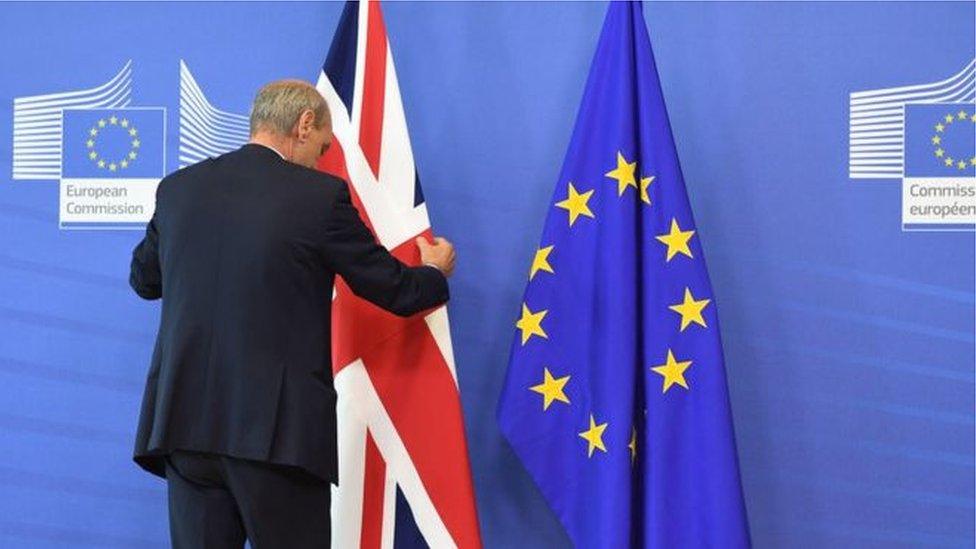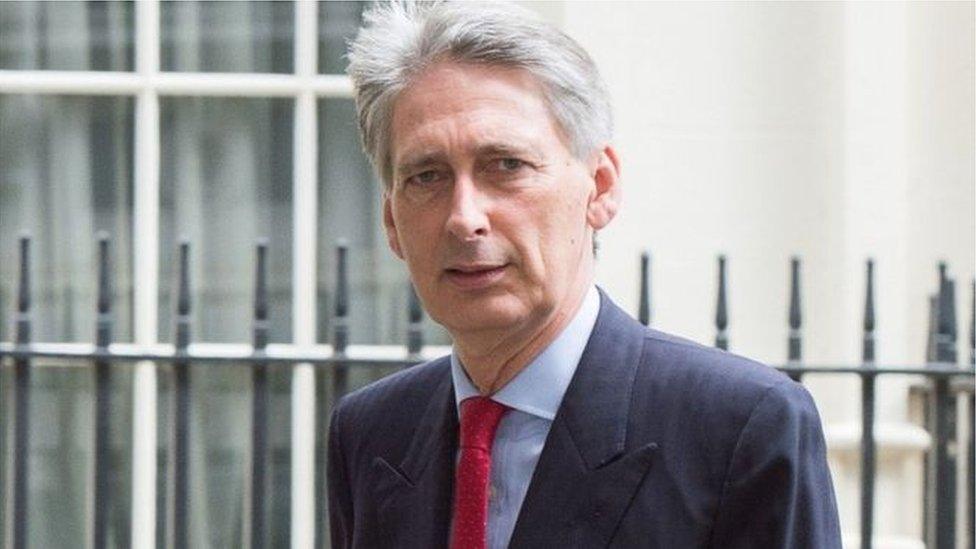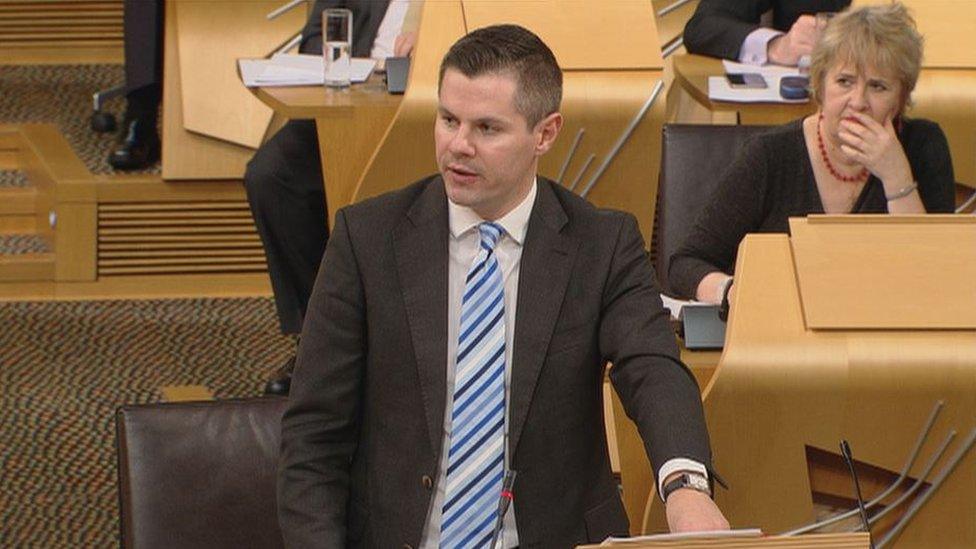Brexit's bumpy landing
- Published

We've got more signs, as a new week begins, that the economic outlook in Scotland has worsened.
From the Purchasing Managers Index, compiled by Markit for the Bank of Scotland, there's a dip into contraction territory.
The one from accountancy firm BDO uses different methodology, and says the Scottish private sector is evenly balanced between recovery, a recession and stagnation.
It has particularly gloomy figures about manufacturing.
But is it too soon to say this is about that referendum vote to leave the European Union?
Unleashed weaponry
It is taking a long time to get the full picture of what's now happening in the economy. The output figures for this month, compiled by the Scottish government's statisticians, won't be published until next January. So these surveys are our best guide.
Last week, the British outlook for purchasing managers took a very sharp dip, across the dominant service sector. Manufacturing and construction were also looking weak.
That was the final signal the Bank of England needed to persuade its economists to unleash its weaponry to avoid recession. The rate cut was to be expected, and may not make much difference at such low levels.
But the creation of new money, and a whopping £70bn of it, will have a real impact on the economy and of the perception of the seriousness of the situation, at least as it is seen by Bank of England economists.
That stimulus is intended to steer Britain out of recession. But it does so by risking inflation, lowering bond yields which hits pension schemes hard, and probably focussing the benefit on those who already hold assets, meaning wealth inequalities are exacerbated.

Avoiding recession must be new Chancellor Phillip Hammond's top priority
This week, the parallel Scottish survey of purchasing managers is showing a similar decline to sectoral UK ones. It's not absolutely clear that this is due to the Brexit factor, but there is "anecdotal" evidence from the survey that it is.
Scotland's economy, measured by output, employment, along with those purchasing managers, was already worse-performing than the UK as a whole.
It was only with the help of the construction sector, itself boosted by public sector contracts, that Scotland avoided recession.
Some of that was probably caution ahead of the referendum. More of it is likely to have been the impact of the downturn in oil and gas.
Bumpy landing
Global factors play a part, but the global economy has stabilised this year, while Britain's and Scotland's have not.
The year started with concerns about Chinese growth stalling, and about the oil price falling.
Neither of these challenges has gone away - far from it - but markets seem to have adjusted to those risks. The fear that British 'Leave' voters are forcing a bumpy landing for its trading partners has receded, for now.
That makes the problems facing Britain all the more stark. And the transition of leadership in Downing Street leaves a lot of the questions unanswered.
The people who argued for Brexit have not been eager or able to explain what it really means, how the dislocation will work, and how a new trading order will be established, or when.
Nor has the new Chancellor, Philip Hammond, been doing much to set out a new direction for government economic policy.
He has talked of a "reset", though that's another word with little meaning in this context. Ironically, it's a term used with consumer goods to return them to "factory settings". But in economic policy, it is being taken to mean that the core aim of deficit-reduction is no more.
Shovel ready
Avoiding the recession is surely the top priority, so expectations are rising that we could be seeing Mr Hammond use his Autumn statement (as late as December?) to stimulate the economy, working against the pressure of the downturn to limit the damage it might do.
What will he be considering? The business lobby, and plenty others besides, are urging him to splurge on infrastructure, and particularly roads. That's where projects are more likely to be "shovel ready", and where the benefits can be spread around the country a bit.
He could take a lesson from the Chancellor seven years ago, when Labour's Alistair Darling responded to the precipitous downturn by cutting the VAT rate from 17.5% to 15% as a stimulus. It was subsequently raised to 20%.
In a party as bruised and fractious as the Conservative Party, it would do the new Chancellor no harm to reassure them that he's of a tax-cutting frame of mind.
True economic conservatives are unlikely to be impressed, however, by the idea of "helicopter money" - dropping cash from the skies on to a grateful or bemused populace, perhaps with an incentive to spend within a deadline. But there are market purists who think that would be the most effective help to the economy.

Derek Mackay needs to secure sufficient votes to get the finance bill through Holyrood
So then, what can the Scottish government do? It could use its own, new, tax powers, as Labour and the Greens will (probably) urge it to do.
SNP ministers don't have a majority any more, so they need votes to get their budget enacted. Either that, or they need to ensure the opposition parties don't gang up on new finance minister Derek Mackay.
The Scottish government is urging Westminster to go for a stimulus. If it's not enough, there will be pressure for Holyrood to do its own bit. That's even if the Nationalists were against this in their manifesto. In the current circumstances, manifestos carry an invisible get-out clause.
Derek Mackay and Nicola Sturgoen wouldn't be alone: the Tory government is using a similar clause to ditch the core fiscal discipline pledge on which it was elected last year.
But there's a problem with timing. The draft budget should be presented to MSPs in mid-to-late-September.
That's not how it was in 2014, due to the independence referendum. Last year, John Swinney was waiting for George Osborne's spending review. And when he finally got it, he didn't apply that beyond the current financial year.
Block grant
In Swinney's place, and facing immense uncertainty, it would be brave of Derek Mackay to set out multi-year budgets - and not "brave" in a good way.
The new finance minister has got that challenge to secure sufficient votes to get the finance bill through Holyrood. He'll have to do it in quite a rush. If Phillip Hammond takes until late November or early December, the Scottish government would be going some to get a draft budget published by Christmas. That makes for a very tough two months of legislating, and cuts down the opportunity for detailed, informed scrutiny by MSPs.
Mr Mackay is currently planning with the expectation of a squeeze of some sort in the block grant from Westminster.
But he's got much more work this year on the tax-raising end of things. It wasn't clear how much will be raised through the Scottish Rate of Income Tax next financial year, when new tax powers are introduced. It's less clear what a slowdown in growth would mean when those powers are expanded to all of income tax.
And if it wasn't clear before the 23 June referendum, it's a lot less clear now.